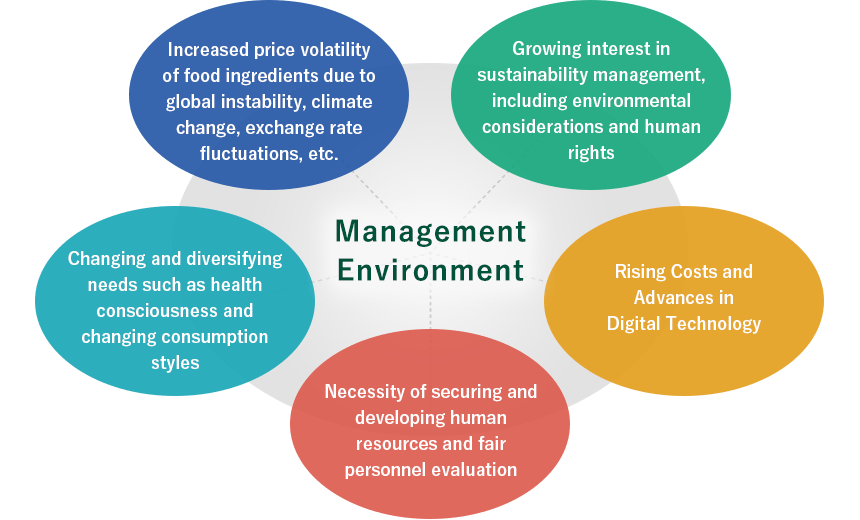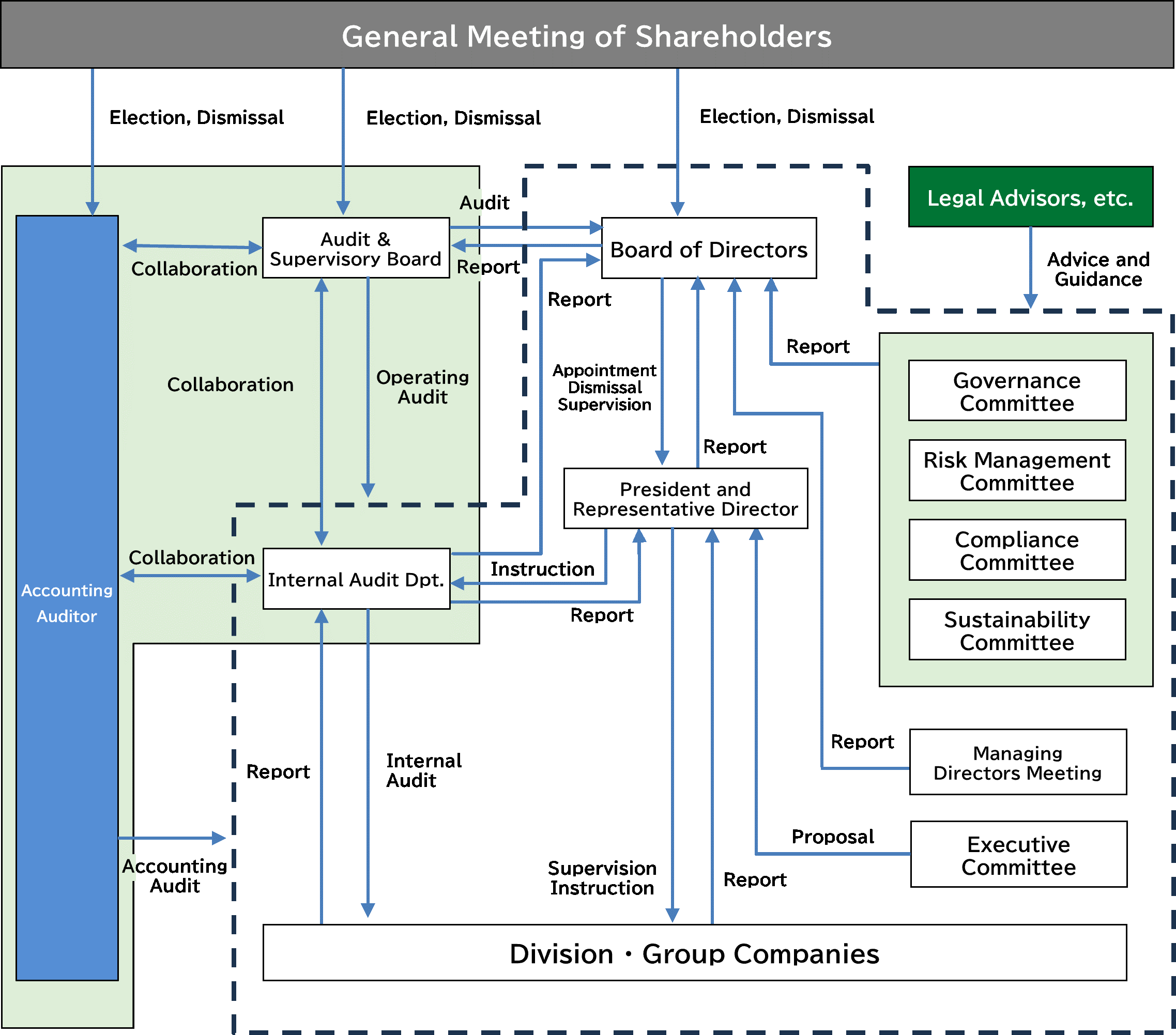Management Information
Message from the President
I would like to express our sincere gratitude to our shareholders and investors for their exceptional support.
The business environment surrounding our company is characterized by solid corporate performance and favorable stock prices. However, the yen continues to weaken due to factors such as the Bank of Japan's cautious stance toward interest rate hikes, and prices, particularly for imported goods, continue to rise. In the food industry, prices continue to rise, but there is also a trend toward consumers becoming more frugal, leading to a continued trend toward strengthening product appeal. Under these circumstances, our group is making efforts to supply value-added products by leveraging the strengths of having both trading company and manufacturing functions, such as strengthening collaboration with overseas suppliers and developing products that meet customer needs.
As a result of these efforts, consolidated net sales for the fiscal year ended October 2025 (78th fiscal year) increased by 8.4% year on year to 124,897 million yen, thanks to increases in sales across all segments—Japan, the United States, and China. On the profit front, operating profit increased by 2.0% year on year to 4,942 million yen, and ordinary profit increased by 0.8% to 4,992 million yen. This was owing to an increase in gross profit resulting from price optimization by reflecting increases in raw ingredients costs despite an increase in selling, general and administrative expenses resulting from costs for digital transformation and increases in personnel expenses. Profit attributable to owners of parent decreased 4.2% year on year to 3,035 million yen due to 144 million yen of advisory fees for core system renewal recorded in software in progress in the previous fiscal year being recorded as extraordinary losses based on a review of development requirements, in addition to 290 million yen for the compensation for damage as a result of labor litigation at affiliates in the United States and at others.
For the fiscal year ending October 2026 (79th term), while concerns remain about the impact of slowing exports due to Trump tariffs, corporate earnings continue to be strong, and a recovery in capital investment is anticipated. Consequently, positive growth is expected for the Japanese economy. On the other hand, the impact of rising prices due to yen depreciation is expected to continue, and the economic environment surrounding our Group is anticipated to remain uncertain.
We will continue striving for stable food ingredient supply by further diversifying suppliers and production regions. Simultaneously, we aim to achieve sustainable Group growth by enhancing our product planning capabilities.
We look forward to your further support and guidance.


Management Environment & Management Strategy
We see the following five management environments that need to be addressed from a medium- to long-term perspective in particular, and have established basic management strategies to address these environments.

|
1. Growth Strategy as a Food Specialty Trading Company |
|
|---|---|
|
Maintain and Expand |
◆Strengthen initiatives with existing clients |
|
Challenge New Fields |
◆Develop new products / Introduce new items |
|
Deepen Focus on |
◆Expand transactions with growing industries and sectors |
|
Diversify Sourcing |
◆Build a multi-origin purchasing system for imported raw ingredients ◆Promote supplier diversification |
| 2. Growth Strategy as a Food Manufacturer | |
|---|---|
|
Expand Growth |
◆Strengthen and expand sales of products with competitive advantage ◆Nurture in-house processed products for growing markets |
|
Strengthen Production |
◆Increase production capacity through line expansion and equipment installation ◆Expand value-added product groups by strengthening development functions |
| Promote Rationalization | ◆Rationalize manufacturing processes through mechanization and labor-saving measures ◆Review production management and cost management |
| Initiatives for Security and Safety | ◆Respond to regulations on allergens, additives, etc. ◆Introduce specification sheet creation systems |
| 3. Expansion of Management Foundation | |
|---|---|
|
Promote Digital |
◆Promote core IT system replacement project |
|
Strengthen Human |
◆Establish new personnel system and strengthen recruitment/development initiatives ◆Ensure accuracy of human capital disclosure data |
| Review Logistics Operations |
◆Respond to revised logistics laws and improve efficiency ◆Promote BCP (Business Continuity Plan) measures |
| Enhance Corporate Governance |
◆Establish legal and compliance organization ◆Revise executive compensation system |
| Expand IR and PR Functions |
◆Revise corporate website ◆Hold financial results briefings |
| Promote Sustainability | ◆Improve external ESG evaluation scores |
Management Objectives & Shareholder Return Policy
◆As for net sales, changes in local prices reflecting changes in crop yields and demand, and fluctuations in foreign exchange rates cause changes in the unit purchase prices of imported food materials, which in turn cause changes in selling prices. Therefore, as a management indicator, our main goal is to increase gross profit and operating income rather than net sales.
◆In addition, our policy is to aim for an ROE (return on equity) of 8% over the medium to long term in order to sustainably increase corporate value. Although it is currently below 8% due to aggressive capital investment such as new plant construction and the recording of depreciation and amortization expenses, we aim to achieve 8% over the medium to long term.
◆In terms of profit distribution,we regard the return of profits to shareholders as an important management issue and makes it a basic policy to maintain stable dividends and to pay dividends from surplus twice a year, once as an interim dividend and once as a year-end dividend, based on a comprehensive assessment of business investments to achieve medium- to long-term growth and the level of retained earnings. Our basic policy is to pay dividends twice a year, an interim dividend and a year-end dividend.
Business Risks
Risks with the potential to negatively affect the Group’s financial status and management results are as follows, and we see them as factors that may significantly impact investor decisions. Though the items below include future items, they were interpreted as of January 30, 2024, the day we submitted our securities report.
(1)Food safety
The Group sources products and ingredients from Japanese and overseas manufacturers and producers, and has production subsidiaries in Japan, the US, and China. We endeavor to enhance quality management and secure food safety by measures such as holding regular meetings with participants from the Quality Assurance Department and plants both in Japan and overseas. However, unpredictable issues and accidents in the manufacturing or processing lines could cause large-scale product recalls or large product-liability costs that would affect the Group’s financial status and management results.
(2)Inventory
The Group handles a wide variety of food ingredients and products. In particular, we maintain a certain amount of inventory centering on imported ingredients and products. We focus on inventory management to ensure we carry no excess inventory or expired product, by carefully taking into account harvest timing for agricultural products, production schedules at each plant, shipping schedules to our clients, and food expiry dates, as well as by assigning a person-in-charge for each product, who conducts frequent information exchanges with sales representatives. However, stock disposal due to disparity between sales forecasts and actual results, as well as substantial price fluctuations, could affect the Group’s financial status and management results.
(3)Stable procurement of food ingredients and their rising prices
As the Group sources food ingredients and products in and outside Japan, we face risks such as poor harvests due to natural disasters and climate change, which makes it difficult to secure consistent quality and quantity. We also face the possibility of our purchase and production costs being greatly affected by fluctuations in the overseas market prices of agricultural products due to changes in demand, or by exchange rate fluctuations. To counteract the above, we assign a procurement person-in-charge for each product, and strive to secure a consistent supply by conducting frequent information exchanges with each supplier and verifying the conditions of crops. However, if fluctuations occur on an unpredictable scale, the quality of ingredients and products may be compromised, or shortages may occur, which could impact the Group’s financial status and management results.
(4)Epidemics of communicable diseases or natural disasters
On top of sales offices, the Group also promotes its business through production plants and such. While the Group strives to control risks by such efforts as regularly reviewing the business continuity plan (BCP) and utilizing insurance, unpredictable natural disasters such as large earthquakes and extensive fires could cause loss or damage to the Group’s facilities and plants. In addition, large-scale epidemics of communicable diseases could damage our product supply which rely on ordering and shipping activities, and our production activities which rely on plants, thus affecting the Group’s financial status and management results.
(5)Impact of business globalization
The Group sources a portion of food ingredients and products from overseas, and operates production bases and sales businesses overseas. While the Group aims to manage related risks by designating departments dedicated to overseas procurements and a department to the management of overseas Group companies, wars, terrorism, political or social unrest, disadvantageous taxation and regulations, their amendments and abolition, and other unpredictable circumstances, or a defect in the governance of an overseas Group company, may affect the Group’s financial status and management results.
(6)Trade credit risks
The Group has experienced credit risks owing to accounts receivable of trade partners. We work to prevent credit risks by setting credit limits for each partner based on credit analyses and reviewing the partner based on the approval authority reflecting the credit limit. However, uncollected debts arising from unpredictable circumstances such as bankruptcy of our trade partners could affect the Group’s financial status and management results.
(7)Compliance with legal regulations, etc.
Our business activities are regulated in Japan by laws such as the Food Safety Basic Act and Food Sanitation Act, and in other countries where we conduct businesses by similar legal regulations. Although we have laid out appropriate measures to comply with these regulations, changes in these regulations or receiving a violation warning could limit the Group’s business activities and adversely affect our financial status and management results.
(8)Information and systems
On the back of the advancement of digitalization, besides order, purchase and accounting processing being conducted via information communications and data processing, communication with business partners, information exchanges within the Company, etc. also utilize electronic exchange methods. Therefore, the Group strives to reduce related risks by designating a department dedicated to information systems. However, if an information leakage, data loss, or virus attack occurs, the Group’s corporate activities may be hindered, which may affect the Group’s financial status and management results.
(9)Risks Related to Domestic and International Transportation
In response to labor shortages in the logistics industry, the Group is promoting a modal shift from trucking to rail freight and other modes of transportation, as well as unloading imported cargo at ports close to consumption centers. However, if problems arise, such as delays in product delivery due to a shortage of delivery drivers or a significant increase in logistics costs due to soaring labor and fuel costs, our group's business results may be affected. In addition, the increasing instability in global marine transportation may cause delays in the procurement of products and increases in logistics costs, which may affect the financial position and business performance of the Group.
Corporate Governance
Our Corporate Governance
Our basic approach to corporate governance The Group’s corporate philosophy is to "create a new food culture and contribute to society by consistently providing our customers with safe and reliable food products carefully sourced from domestic and overseas suppliers." To achieve this philosophy, it is important that we continue to exist as a company trusted by our shareholders and all stakeholders of the society, by ensuring healthy management with high transparency. Aiming for sustainable growth and improving our mid- to long-term corporate value, we will work to improve our corporate governance and build and operate a system to monitor and control our business activities.
Organization Chart of Corporate Governance

